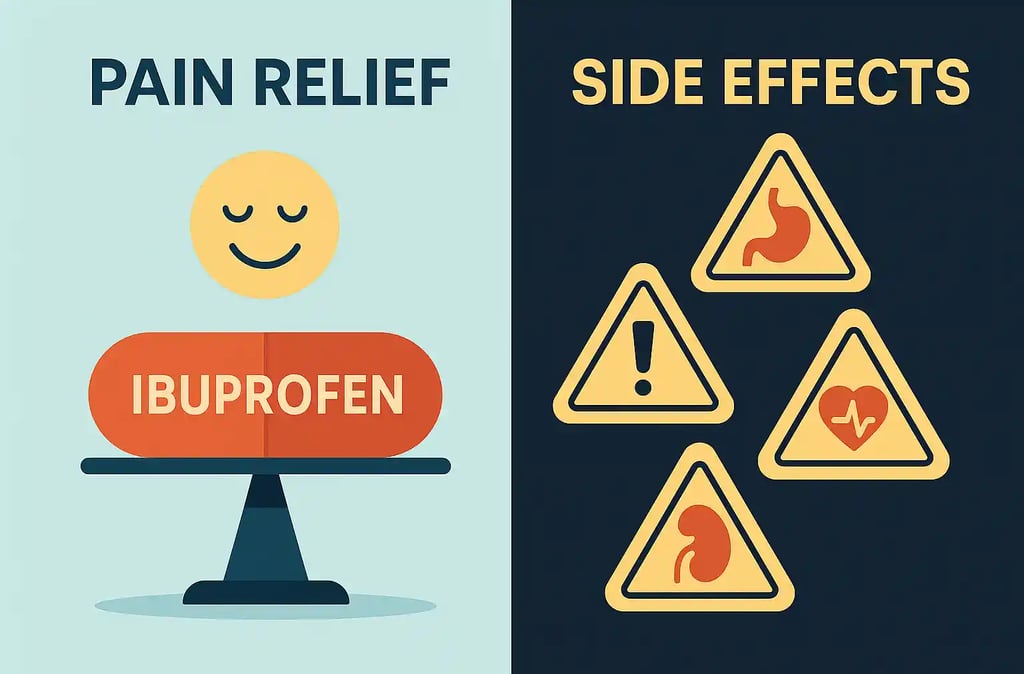Managing Ibuprofen Side Effects: What to Watch For and How to Minimize Risk
Learn how to manage ibuprofen side effects safely. Discover common risks, serious warning signs, and practical tips to minimize complications.


Managing Ibuprofen Side Effects: What to Watch For and How to Minimize Risk
Ibuprofen is one of the most commonly used medications worldwide. For many people, it’s an easy way to relieve pain, reduce fever, or calm inflammation.
But like all medications, it comes with potential side effects — and the risks increase if it’s taken in high doses or for long periods of time. Understanding what to watch for and how to minimize those risks can help you use ibuprofen safely and effectively.
Common Side Effects to Know About
Most people tolerate ibuprofen without major problems, especially when taken occasionally. Still, some side effects are relatively common and worth noting. These can include:
Stomach upset or indigestion
Nausea or dizziness
Mild headache
Drowsiness or fatigue
Fluid retention, which may cause swelling in the hands, feet, or ankles
These effects are often temporary and may not be as severe if your ibuprofen is taken with food or in lower doses. However, if they persist or worsen, it’s best to stop taking ibuprofen and consult a healthcare provider.
More Serious Ibuprofen Risks to Watch For
In some cases, ibuprofen can cause more serious side effects, particularly with frequent or long-term use. These include:
Digestive System Problems
By reducing protective prostaglandins in the stomach, ibuprofen can increase the risk of ulcers, bleeding, or severe irritation in the digestive tract. Symptoms to watch for include persistent stomach pain, black or tarry stool, or vomiting blood.
Kidney Issues
Because ibuprofen affects blood flow to the kidneys, it can lead to reduced kidney function over time. Warning signs include swelling, fatigue, or decreased urine output. People with existing kidney disease are at higher risk and should only take ibuprofen under the guidance of a medical practitioner.
Heart and Circulatory Risks
Using ibuprofen regularly doesn’t just affect pain and inflammation — it can also impact the cardiovascular system. Over time, frequent use may raise blood pressure, which puts added strain on the heart and blood vessels. In some cases, especially with high doses or long-term use, this increased strain can raise the risk of serious events like heart attack or stroke.
Warning signs to watch for include chest pain, shortness of breath, sudden dizziness, or weakness or numbness on one side of the body. These symptoms require immediate medical attention, as they may signal a medical emergency.
Liver Stress
Though less common, ibuprofen can also put stress on the liver, especially when combined with alcohol or other medications. Signs of liver trouble can include yellowing of the skin or eyes (jaundice), dark urine, or severe fatigue.
Strategies to Reduce the Risk of Ibuprofen Side Effects
The good news is that many ibuprofen side effects can be minimized with simple precautions. Experts generally recommend:
Using the lowest effective dose — Take only as much as needed to relieve your symptoms.
Limiting duration — Avoid taking ibuprofen for longer than a few days unless advised by a doctor.
Taking with food or milk — This can help reduce stomach irritation.
Avoiding alcohol — Mixing ibuprofen with alcohol raises the risk of stomach bleeding and liver stress.
Checking drug interactions — Certain medications, such as blood thinners or steroids, can amplify ibuprofen’s risks. Always check with your doctor or pharmacist.
Monitoring your health — If you need to use ibuprofen frequently, schedule regular checkups to monitor your blood pressure, kidney function, and overall health.
Click here for information on other pain relievers and Natural Pain Relief Alternatives.
When to Seek Medical Advice for Ibuprofen Side Effects
If you experience severe stomach pain, chest tightness, unusual bleeding, swelling, or any sudden changes in your health after taking ibuprofen, it’s important to seek medical care right away. Even common side effects can become dangerous if ignored.
The Bottom Line
Ibuprofen is an effective pain reliever, but it’s not without risks. The key to safe use is knowing what side effects to watch for and taking steps to minimize them. By using the lowest dose for the shortest necessary time — and by paying attention to your body’s signals — you can get the benefits of ibuprofen, while lowering the chance of serious problems.




